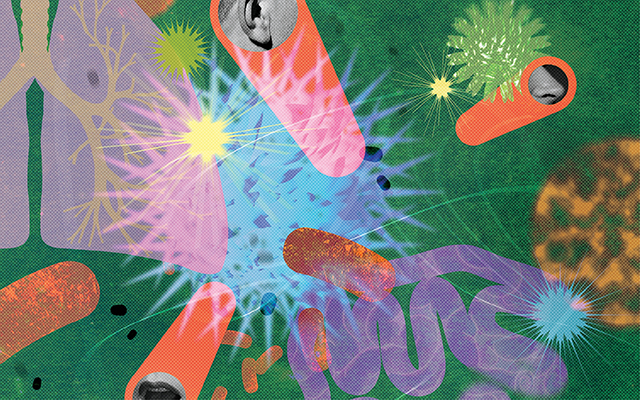Your immune system is your security detail. It is hardwired to differentiate between what belongs in your body and what doesn’t. When it spies a meddler, such as a virus, bacterium, or parasite, it shoots to kill. Unfortunately, the system is not perfect. Sometimes it targets healthy tissues, a situation that, if it persists under certain circumstances, can lead to an autoimmune disease or autoimmunity.
What Is Autoimmune Disorder?
“Auto” means self; so, “autoimmunity” basically means your immune system takes aim at itself.
More than 23 million Americans suffer from autoimmunity, which makes it the third most common category of illness in the United States after cancer and heart disease. Yet, 90 percent of Americans cannot name a single autoimmune disease, writes Donna Jackson Nakazawa in her book The Autoimmune Epidemic. “It boggles the mind,” she says. The name deserves some of the blame. “Autoimmune disease” is an umbrella term for dozens of conditions, most of which do not actually use the word “autoimmune” in their titles.
Some of the most common autoimmune diseases include:
- Rheumatoid arthritis
- Type 1 diabetes
- Lupus
- Hashimoto’s thyroid disease
- Multiple sclerosis (MS)
- Inflammatory bowel disease (IBD, which includes Crohn’s disease and ulcerative colitis)
- Celiac disease
- Asthma
The National Institutes of Health (NIH) currently labels more than 90 diseases as autoimmune disorders, and that number is certain to rise as scientists continue to identify and further understand the origin of other diseases. Type 1 diabetes, for example, was only recently found to be autoimmune driven. (For a list of more autoimmune diseases, see “39 Known Autoimmune Disease Disorders” below.)
At first, the medical establishment more or less missed this epidemic because specialists who rarely talked to one another treated individual diseases in a vacuum, says Nakazawa. Patients suffering from joint problems, like rheumatoid arthritis and lupus, typically saw rheumatologists; those with skin issues, like psoriasis, went to dermatologists; gut disorders, like Crohn’s disease, ulcerative colitis, and irritable bowel syndrome, fell under the jurisdiction of gastroenterologists; and so on. “There was no one standing on the mountaintop saying, ‘Wow, look what’s happening in all these valleys,’” Nakazawa says.
The system is catching up to the problem and adapting its protocols, though. One catalyst for the change is the ever-widening scope of the problem. Since the 1950s, celiac disease alone is up fourfold, lupus rates have tripled, and type 1 diabetes has soared — up 23 percent in the past decade alone.
Every autoimmune disease has three basic ingredients: a genetic predisposition, an environmental trigger, and a leaky gut.
Today’s doctors and scientists also have a more sophisticated understanding of how the immune system can go awry. One of the top experts in the field is Alessio Fasano, MD, the director of the Center for Celiac Research & Treatment at Massachusetts General Hospital for Children in Boston. Decades of research led him to deduce that every autoimmune disease has three basic ingredients: a genetic predisposition, an environmental trigger, and a leaky gut.
Identifying the first two components was easy. Scientists have long known that autoimmunity runs in families and that onset of some disease can be triggered, for example, by an environmental factor such as an infection. But it wasn’t until 2000 that Fasano and his team discovered the third and final ingredient — a leaky gut. Specifically, Fasano discovered zonulin, a protein that regulates gut permeability.
“Zonulin works like the traffic cop of our bodies’ tissues,” he says. “It opens the spaces between cells, allowing some substances to pass through while keeping harmful substances out.” Some people produce excess amounts of zonulin, which pries apart the cells of the intestinal lining and allows toxins, bacteria, and undigested bits of food into the bloodstream — hence the term “leaky gut.”
While functional- and integrative-health practitioners have long said gut permeability is the crux of chronic ills, including autoimmune disorders, many conventional physicians distanced themselves from the idea. The science behind gut permeability, however, is now too convincing to ignore.
The leaky gut is especially important in any conversation about autoimmune disorders because it’s the thing that allows environmental factors to trigger predisposed genes.
The Gene Tree
Family history accounts for roughly one-third of the risk of developing an autoimmune disease. Certain clusters of genes can directly affect the immune system, making it hyperreactive. Other genes play an indirect role by exposing an organ to attack.
Family history accounts for roughly one-third of the risk of developing an autoimmune disease.
Although the science of genetics and autoimmunity is in its infancy, researchers have discovered a combination of genes called human leukocyte antigens (HLA for short), which may determine who develops an autoimmune disease and who does not. In short, it is most important to understand that genes determine how sensitive your immune system is to environmental triggers.
Environmental Toxins
Some toxins alter the structure of our DNA, which can prompt the immune system to see the mutated tissue as a foreign substance and attack.
The surge of autoimmunity paralleled the growth of consumer products made from plastics, artificial fibers, and synthetic dyes. There are now more than 80,000 chemicals used in commercial products, and less than 15,000 of those have been safety tested (much less tested in frequently used combinations). According to consumer advocates at the Environmental Working Group, the average person is exposed to more than 126 chemicals before even leaving the bathroom in the morning (shampoo, conditioner, toothpaste, soap, deodorant, sunscreen, etc.).
The surge of autoimmunity paralleled the growth of consumer products made from plastics, artificial fibers, and synthetic dyes.
Chemicals in personal-care products might be one reason that the majority of autoimmune sufferers — 78 percent — are women. Nakazawa thinks it is only a matter of time before scientists connect the dots between the gender difference in autoimmune diseases and endocrine disrupters in women’s personal-care products, such as phthalate esters and parabens in things like lotion, perfume, and sunscreen.
Studies are underway to pinpoint which chemicals are most egregious. One that comes up again and again is mercury, which can trigger autoimmunity by ramping up the production of lymphocytes, a type of white blood cell in the immune system.
Additionally, the NIH is researching whether a protein in cow’s milk may help trigger type 1 diabetes in genetically susceptible children.
Infections can also cause autoimmunity. Certain infections, such as group A beta-hemolytic streptococcus, spark the onset of rheumatic heart disease, an autoimmune disease that attacks the heart. Infections may also kick off type 1 diabetes, MS, lupus, and rheumatoid arthritis.
Leaky Gut and Autoimmune Diseases
You might be genetically susceptible and be exposed to a host of environmental triggers, but in most cases you won’t develop autoimmunity unless you also have a leaky gut.
The gut’s slick, slimy insides, if spliced and laid flat, would carpet a tennis court. The uppermost lining is a mere one cell thick and is home to trillions of bacteria. In a healthy gut the good bacteria outnumber the bad. But keeping a healthy ratio is tough. Years of eating junk food, popping pain relievers, and experiencing stress inflames the gut’s lining.
Everyone’s gut can spring a leak from time to time. A leak can form after an infection, a virus, or gastric upset. Some people have symptoms, like bloating, gas, or indigestion. If the gut is healthy, the lining will heal. But if the gut is in bad shape, it may not be able to close the fissures.
“Humans evolved over 2.5 million years, during which time our immune system was designed to attack one enemy: infection. Now the same machinery is forced to fight thousands of enemies it has never seen before.”
Inside a leaky gut, zonulin opens the door for bacteria, viruses, fungi, parasites, chemicals, and pollutants to enter the bloodstream. Confronted with a steady stream of invaders, the immune system makes T helper cells, which speed up its response.
“Humans evolved over 2.5 million years, during which time our immune system was designed to attack one enemy: infection,” says Fasano. “Now the same machinery is forced to fight thousands of enemies it has never seen before.”
Not every leaky gut will lead to an autoimmune disease, but if you are genetically predisposed, the fight can be very dangerous. Substances produced by T cells can irritate and inflame the body and indirectly activate genes capable of triggering autoimmunity.
What to Eat to Support Your Gut Health
The body’s capacity to withstand autoimmunity is like a barrel’s capacity to hold water, says Nakazawa. The body’s barrel is half filled with factors you can’t control, like your gender and your genes. The other half is filled with things we can control, such as how many chemicals we put in our bodies.
A healthy diet creates a healthy gut. It protects your body from autoimmunity. “When you heal your gut, you automatically lower what’s in the barrel,” Nakazawa says.
Functional-medicine pioneer Mark Hyman, MD, calls the gut the “inner tube of life” and offers seven steps to keep it happy and healthy:
- Eat whole unprocessed foods, like vegetables, beans, nuts, seeds, and whole grains.
- Pinpoint food allergies. For two weeks, cut out gluten, dairy, yeast, corn, soy, eggs, and other highly allergenic foods, and see how you feel.
- Curb infections and bug overgrowth. Parasites, small bowel bacteria, and yeasts can hurt gut function. Find a healthcare practitioner who can help you clear up these underlying problems before they get out of hand.
- Reseed your inner ecosystem with prebiotic and probiotic-rich foods, like plain yogurt, sauerkraut, kimchi, kefir, etc.
- Boost your digestive enzymes. Without enough enzymes, the gut can’t break down food into the nutrients your body needs. Taking a broad-spectrum digestive-enzyme supplement with your food can help.
- Eat good fats. Specifically, studies show omega-3s protect against autoimmunity by reducing inflammation and helping heal a leaky gut.
- Plug any leaks. Gut-healing nutrients, like glutamine and zinc, help repair the gut’s lining so that no more nasties can slip through.
(See “Recipes to Heal a Leaky Gut” and “7 Gut-Healing Foods” for guidance on what to eat to help build a more resilient gut.)
Early Intervention
If you suspect you have an autoimmune disease or if you are at high risk, ask your doctor for an ANA (antinuclear antibody) test. The immune system makes antibodies to fight infection. An antinuclear antibody is one that attacks your own tissue. Antinuclear antibodies in your blood can be a red flag that an autoimmune disease is around the corner.
The test does lack precision. False positives are routine, and even when the test is accurate, it can’t tell you what disease you’re in for. Will your autoimmunity attack your joints? Your thyroid? Your skin? “Unfortunately, the gut is not like Las Vegas,” says Fasano. “What happens in the gut doesn’t necessarily stay in the gut.”
To provide patients with a more exacting diagnosis, the medical community is now working to identify disease-specific antibodies. Thus far, scientists have pinpointed antibodies for lupus, rheumatoid arthritis, multiple sclerosis, and even type 1 diabetes. The tests are the closest thing in medicine to a crystal ball. Your physician can identify the earliest whiffs of a disease, meaning you can take action to turn things around. “The goal is to find people who are on the road to an autoimmune disease and short-circuit the process,” says David M. Brady, ND, director of the Human Nutrition Institute at the University of Bridgeport in Connecticut and a functional- and nutritional-medicine practitioner.
“The science is powerful but imprecise,” Fasano cautions. “Someone can test positive for antibodies, but it’s anyone’s guess when the disease will appear.” That kind of moving target, especially for a serious disease such as type 1 diabetes, can make treatment harder to determine and access.
Brady and other functional-medicine practitioners are hopeful, though. “We don’t go from health to an autoimmune disease overnight,” Brady says. “We progress over years until there is a tipping point.” (Picture your personal barrel of water here.)
Brady goes on to point out that simple lifestyle interventions, like taking probiotics, getting plenty of vitamin D, and reducing stress (cortisol weakens the stomach’s lining), may be enough to heal or prevent leaky gut. The upshot? A healthy gut means there is no bridge between your genes and your environment.
“If we can intervene early,” Brady says, “we can make some strong inroads in treating and preventing these diseases.”
39 Known Autoimmune Disease Disorders
As scientists learn more about the immune system and the different ways it can attack the body, they are connecting the dots between diseases and autoimmunity. Therefore, a complete list is almost impossible to collect at this time. Scientists suspect that many diseases are involved with autoimmunity but have yet to confirm them. That said, the majority of known autoimmune diseases include:
|
|
Autoimmunity: A Tragedy in Five Acts
The curtain rises inside a woman’s body. The backdrop is a mix of genes, some of which maker her immune system hyperractive. Also present are proteins called HLAs (human leukocyte antigens). HLAs lurk beneath nearly every autoimmune disease.
Act I:
Her microbiome upon birth, which is her inner ecology of bacteria, blooms. If born vaginally, she receives a “starter kit” of bacteria from Mom. If Mom has an off-kilter microbiome, so will the baby. If she’s born via C-section, her microbiome is crowd sourced from doctors, nurses, parents, and visitors. And, if she is born in the United States, her blood will contain up to 232 industrial compounds and pollutants.
Act II:
Like a typical American kid, she eats plenty of junk food; gets lots of ear infections, which often are treated with antibiotics; and is often doused in sunscreen. She may develop eczema, allergies, or even asthma. These childhood ills, routine in the United States, can be signs that her microbiome is stressed. The gut’s millions of villi, fingerlike protrusions that extend from the walls to tickle nutrients out of food, shrivel. Wilted villi means less surface area, which means fewer vitamins and minerals are absorbed.
Act III:
In college, she binge drinks, pulls all-nighters, and comes down with mono. She is bloated and constipated but blames PMS. Unbeknownst to her, the gut’s lining is battered and bruised, which causes low-grade inflammation. Over time, inflammation takes a toll. The cells that create the lining of the gut start out tightly joined, like penny tiles on a bathroom floor. The tight framework keeps toxins inside the gut, on a one-way track to the colon. But, when the tiles are damaged, spaces open up. A human protein, zonulin, acts like a crowbar. The more zonulin, the wider the spaces. Why one person makes more zonulin than another is unclear but may boil down to genes. Studies link high levels of zonulin to autoimmune diseases as well as several types of cancer.
Act IV:
Bacteria, undigested proteins, and toxins slip through the cracked tiles of the gut’s lining and into the body. The immune system is waiting. A battle ensues. Substances produced during the clash trigger dormant genes. The newly awakened genes send signals to the immune system. Blood tests at this stage show antibodies but often can’t predict their path.
Act V:
The immune system perks up at these new signals from the awakened genes. It’s getting fresh orders. The boss changes the strategy. A new enemy is identified and more troops are deployed. But this time the army is misdirected, taking aim at an organ, cell, or tissue of the body itself instead of the enemy. Some battles play out in the gut. Others roam to distant lands, such as the thyroid, brain, or nervous system. Why some skirmishes stay in the gut and others relocate is not well understood. But the result is the same: The body’s most potent weapon turns within. The threshold is crossed. What’s on the other side is a lifelong struggle with autoimmunity.
This article has been updated. It was originally published in the October 2013 issue of Experience Life.




This Post Has 3 Comments
[…] different chemical substances in our cosmetics construct up in our our bodies and contribute to autoimmune disorders. When parabens are mixed with BPA (Bisphenol-A) and PFAS (per and poly-fluoroalkyl) substances they […]
[…] along with other chemicals in our cosmetics build up in our bodies and contribute to autoimmune disorders. When parabens are combined with BPA (Bisphenol-A) and PFAS (per and poly-fluoroalkyl) substances […]
I’m wondering why your list of autoimmune diseases did not include Myasthenia Gravis (MG), which is a disease I live with. This is a good article though — and probably the best explanation of “leaky gut” that I have read.